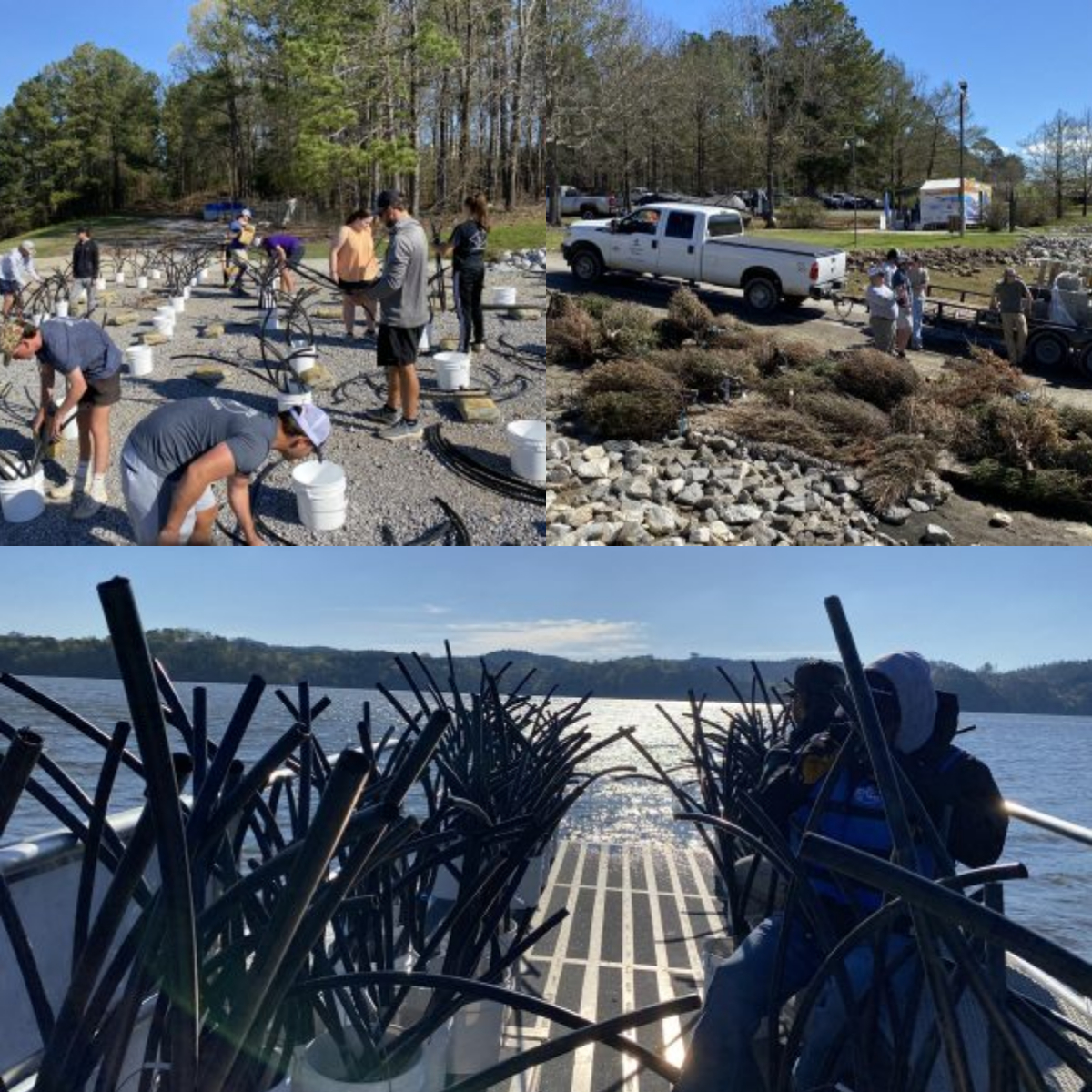
Spring means it’s time to fish for many Alabamians. And, just ahead of the onrush of anglers, Alabama Power and conservation experts, along with several groups of volunteers, worked together to create and improve habitats for fish on Lake Martin and Lay Lake.
March 4, the company partnered with the Alabama Department of Conservation and Natural Resources (ADCNR) and B.A.S.S. high school and college division fishing team members to create habitats on Lake Martin in the Wind Creek area. Students from Ariton High School, Headland High School, Handley High School, Alabama Christian Academy, Auburn University and Faulkner University participated.
The group of 14 adults and 23 students dropped bundles of Christmas trees into the lake tied to cement blocks.
“We’re supplementing the natural habitat in the bottom areas of the lake,” said Mike Clelland, Alabama Power Environmental Affairs specialist. “These trees can last about four to six years before they deteriorate, and even when the tree is gone the blocks remain. The fish love it.”
In all, more than 140 trees provided by Gary Estes of Columbus, GA, the town of Pike Road and by residents around the lake were used to enhance areas that would naturally create an eco-system for resident fish. ADCNR also provided artificial fish-attracting devices (FADs) for deployment in the lake.
“B.A.S.S. has a history of making conservation of our aquatic resources a high priority. Alabama Power has been a great partner in those efforts for many years, working hand-in-hand with our state BASS Nation chapters and High School fishing teams on habitat enhancement projects that benefit everyone that fishes on Alabama Power reservoirs,” said B.A.S.S. Conservation Director Gene Gilliland. “Projects like these not only serve to help restore ageing habitat, but they also offer an opportunity to educate younger generations of anglers about the importance of protecting our aquatic resources for the future of the sport.”
On March 6, Alabama Power worked with students from the University of Montevallo’s President’s Outdoor Scholarship Program to build FADs, also known as spider blocks, that were placed in Lay Lake on March 14. Each time the company deploys a FAD, it is marked via GPS so that the public can find it.
“These artificial habitats can survive much longer than natural structures, which deteriorate over time,” Clelland said. “They will be here for many years and will offer a reliable habitat for fish to thrive.”
Alabama Power has deployed more than 60,000 fish habitats in Alabama’s lakes and rivers since 1993. Clelland says a majority of those used natural materials, such as recycled Christmas trees, stumps and logs.
“As these structures sit in the water, they’ll start collecting algae and macroinvertebrates, which are little insect colonies,” Clelland said. “That, in turn, will attract smaller fish to feed on, and in turn, the larger fish will come to the smaller fish, so we’re creating mini ecosystems throughout the reservoir.”
“It’s always great to team up with Alabama Power to help teach young people on the importance of conservation,” said William Crawford, director of the Outdoor Scholars Program and head fishing coach at the University of Montevallo. “The environmental affairs team does an amazing job with all the conservation efforts that allow our natural resources to continue to thrive here in Alabama.”
Clelland said company experts look at a topographic map of the lake to identify spots where fish would naturally like to congregate. Once on the lake, they make sure it’s an area where boats can travel easily without hitting the structures. He said the company is dependent on volunteers to continue these habitat projects.
“We are always happy to work with anyone who has an interest in helping or who just likes to fish,” he said.
To search for GPS-marked fishing spots, visit apcshorelines.com or download the Smart Lakes app on your mobile device. Volunteers interested in helping with a habitat project may contact Mike Clelland at 205-664-6391.




